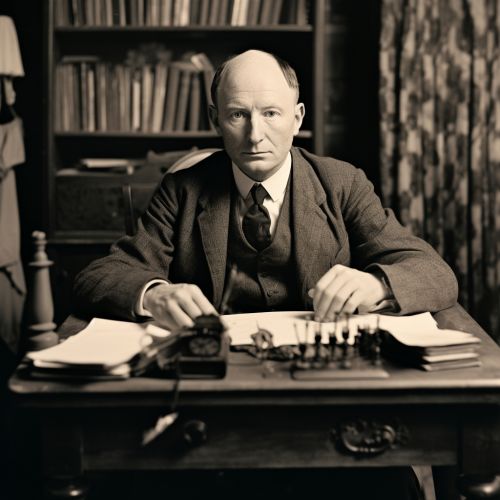Isaac Bashevis Singer
Early Life
Isaac Bashevis Singer was born on November 21, 1902, in Leoncin, Poland. He was the son of a Hasidic rabbi and his wife, Bathsheba. His father's name was Pinkhos Menakhem Zynger and his mother's name was Bathsheba Zylberman. Singer grew up in a Yiddish-speaking household, with his parents and his older siblings, Israel Joshua and Esther Kreitman. His father was a spiritual leader in the Jewish community, and his mother was the daughter of the rabbi of Bilgoraj.
Singer's childhood was marked by the rich cultural and religious traditions of his family. His father's role as a rabbi meant that Singer was exposed to the teachings of the Torah and the Talmud from a young age. He was also influenced by the stories and folklore of the Jewish community, which would later play a significant role in his works.
Education
Singer received his early education at a traditional Jewish religious school, known as a Cheder. Here, he studied the Torah and the Talmud, as well as the works of various Jewish scholars and philosophers. Singer's education was deeply rooted in the Jewish tradition, and this had a profound impact on his worldview and his writing.
In addition to his religious education, Singer also studied secular subjects. He learned Polish, German, and later English, and he developed a love for literature and philosophy. He read widely, from the works of Polish and German authors to the classics of Western literature.
Career
Singer began his career as a journalist in Warsaw, working for the Yiddish-language newspaper, Literarishe Bletter. He wrote articles, essays, and short stories, many of which reflected his interest in Jewish culture and tradition. Singer's early works were well received, and he quickly established himself as a promising young writer.
In 1935, Singer emigrated to the United States, where he continued his career as a writer. He worked for the Jewish Daily Forward, a Yiddish-language newspaper based in New York. Singer's work for the Forward included serialized novels, short stories, and a popular advice column.
Singer's first novel, "Satan in Goray", was published in 1935. The novel, set in the 17th century, explores the impact of a false messiah on a small Jewish community. "Satan in Goray" was well received, and it established Singer as a significant voice in Yiddish literature.
Over the course of his career, Singer published numerous novels, short stories, and children's books. His works often dealt with themes of Jewish identity, tradition, and morality. Singer's writing was characterized by its vivid storytelling, complex characters, and deep philosophical insights.
Recognition
Singer's work was widely recognized for its literary merit. In 1978, he was awarded the Nobel Prize in Literature. The Nobel committee praised Singer for his "impassioned narrative art which, with roots in a Polish-Jewish cultural tradition, brings universal human conditions to life." Singer was the first author writing in Yiddish to receive the Nobel Prize.
In addition to the Nobel Prize, Singer received numerous other awards and honors. He was awarded the National Book Award for Fiction in 1950 for his novel "The Magician of Lublin", and again in 1963 for his collection of short stories, "A Crown of Feathers and Other Stories".
Legacy
Isaac Bashevis Singer passed away on July 24, 1991, in Surfside, Florida. His legacy continues to be felt in the world of literature. His works have been translated into many languages and continue to be read and studied around the world.
Singer's contribution to literature extends beyond his own works. His writing has inspired countless other authors and has played a crucial role in preserving and promoting Yiddish literature. Singer's vivid storytelling, complex characters, and deep philosophical insights have left a lasting impact on the world of literature.
See Also


